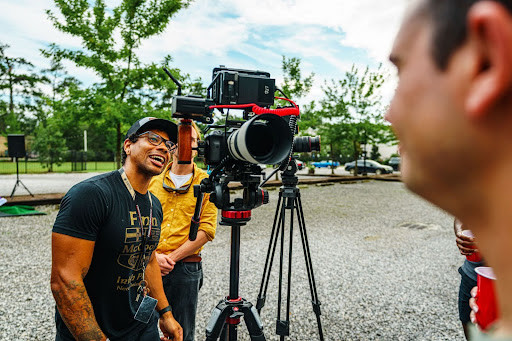In the Age of AI, Human Storytelling Still Reigns Supreme: Why Advidly is Betting on People over Perfection

In a world flooded with AI-generated content and relentless algorithmic churn, there's a quiet revolution that's in play, one that's rediscovering the unparalleled value and necessity of the human voice.
And Skyler Stroup, founder of creative marketing agency Advidly, has been a vocal advocate of this subtle movement. While many race toward automation, Stroup has affirmed that it's these distinctly human stories that cut through the noise, and that's the philosophy that runs through every operation of his business.
Despite keeping human creativity at the forefront of Advidly, Stroup is no stranger to both sides of the storytelling coin.
With a background in digital marketing for one of the travel tech industry's top startups on one hand and a career as a signed musician with a prominent American record label on the other, Stroup has embodied a unique convergence of corporate strategy and raw creativity. This blend, he says, is at the heart of Advidly's success.
Advidly began with a simple yet radical idea, that every brand has a story which deserves to be told with emotion, nuance, and integrity, especially for founders and small businesses that don't see themselves as "marketers." These entrepreneurs are often closest to the magic of their work, yet paradoxically too far from articulating what makes them exceptional - and here's where Advidly comes in, to give a voice and identity to their brand through strategic collaborations and comprehensive marketing services rooted in creative expertise.
"We excavate the story from them and give it life through compelling video, content, and activations," Stroup explains. "The idea is to uncover what's already there and help them see the value in their own story."

For many, this is no easy feat. Cultural conditioning around humility often makes self-promotion feel uncomfortable, and at times, even embarrassing. But Stroup argues that this connection is vital for brands, and that doesn't stem from brashness or bravado, but honesty and authenticity, something that the audience seeks most from companies.
"You don't have to be the next billionaire or run the next conglomerate. That's not how the real world works." Stroup states. "Even if you're a humble plumber, your brand is built on trust, and that's the narrative your marketing needs to reflect. Not some persona that you think you have to adopt to be taken seriously, one that's removed from you, or who your brand is underneath."
This philosophy, for Stroup, is more than just a talking point. It's a sharp critique of the current marketing landscape. As AI tools become more ubiquitous and widely adopted, from chatbots, AI-image generations to cloned avatars that deliver pitch-perfect videos on demand, many businesses are embracing speed, volume, and cost efficiency over substance, leading to an existential crisis in the creative world. Stroup, a passionate spokesperson for creativity and artistic integrity, sees this trend as both inevitable and dangerous.
"There's a real risk of creativity collapsing into redundancy," Stroup says. "If every brand uses the same tools to say the same things, then differentiation disappears. And more importantly, so does trust."
In Stroup's view, AI is a tool, a powerful one that would help facilitate tasks, but it's not a substitute for vision, and it's certainly not a match for human instinct, the very thing that drives the human race.
"We were early adopters of AI platforms," Stroup notes. "But after a year of using it across projects, the patterns started to repeat. There's only so much polish you can apply before it all blends into the same beige." Where AI scales by contributing to the already crowded content noise, Advidly refines. The team is strengthened by a collective of creatives from marketing, entertainment, and independent film backgrounds, and through their artistic prowess, they've deliberately built a foundation that challenges formative content creation.
Advidly's work goes beyond aesthetics. They aim for emotional resonance and connection, which, in today's saturated market and diminishing attention spans, is the key to customer retention. That's why their focus is not just on what a business does, but why it matters, what lies behind the name of the brand, its colors, and its offerings, and affirming to them that these stories are worth telling.
In a recent quote, Author Joanna Machiejewska said, "I want AI to do my laundry and dishes so that I can do art and writing, not for AI to do my art and writing so that I can do my laundry and dishes." As these words resonate across Stroup's philosophy, he insists that at its best, marketing isn't about ego or attention. It's about trust. And trust, he believes, will always require a human touch.
© Copyright IBTimes 2025. All rights reserved.





















